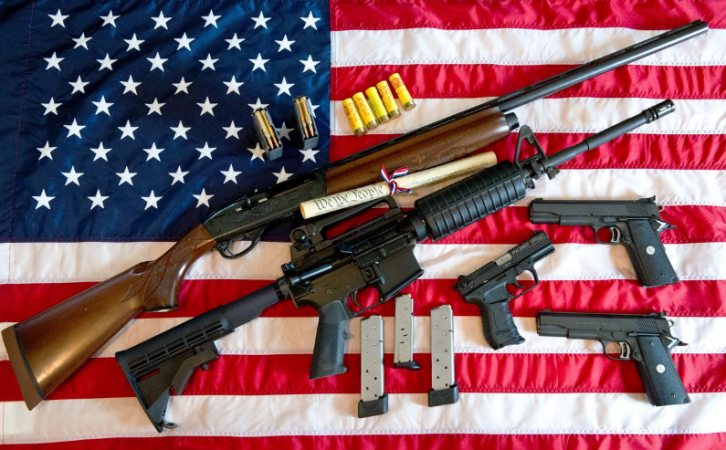
CALIFORNIA: In less than 48 hours, two horrific mass shootings rocked California, killing 11 people in a Monterey Park dance hall shooting on Saturday and seven in a massacre in Half Moon Bay two days later. Agricultural laborers were killed.
According to tragedies, there will be a total of 39 mass shootings in the United States in the first few weeks of 2023. The Gun Violence Archive, which defines a mass shooting as one that results in at least four injuries or deaths, claims that number is higher for this point in the year than any other on record.
Democrats and gun control advocates have said these statistics should serve as a wake-up call for Congress to pass more stringent gun laws in the wake of the shooting.
Also Read: Is China's era of rapid growth truly over?
President Joe Biden said after the shooting in Half Moon Bay that "the scourge of gun violence across America requires strong action" and urged Congress to send him a federal assault weapons ban.
However, a different story is being told by Fox News and other conservative media headlines, which are eager to highlight the fact that these two mass shootings occurred in a state with some of the strictest gun control laws in the country.
This is consistent with the talking point that Republicans often use such tragedies: The shootings in communities attempting to restrict access to firearms, such as California and Chicago, are evidence that such laws do not actually prevent gun violence. Huh.
House Speaker Kevin McCarthy (R-Calif.) made his first comments about the shooting Tuesday, saying that despite strict gun laws in California, "apparently it didn't work in this situation."
But this isn't so easy.
Despite the fact that this week's shooting occurred in California, the state still has one of the lowest firearm death rates in the country, a fact that gun control advocates attribute to the state's recent gun control laws.
Additionally, Californians are about 25% less likely to die in a mass shooting than the average American, indicating that the state's rate of mass shooting deaths is lower than the national average.
Also Read: Tymoshenko submits his resignation as the deputy head of the Ukrainian presidential office
Rates of firearm deaths are nearly three times higher in Mississippi, Wyoming, and Missouri—three states with some of the laxest gun laws in the country—than California.
Despite all the gun control measures California has implemented, including universal background checks, a red flag law and a ban on assault weapons, it still ranks among the country with the laxest federal gun laws in the world.
The Second Amendment has been used by federal judges to overturn some of California's gun laws, and gun manufacturers have found ways to get around the law to sell weapons that are similar to semi-automatic AR-15 rifles in California. Huh. It is easier to transport guns across state borders.
In reference to the state's initiative to reduce gun violence, California Governor Gavin Newsom (D) said Tuesday, "We can't do it alone, and with all due respect, we think we are."
The gun used by the shooter in Monterey Park is generally prohibited in California. Authorities claim they are still trying to determine the provenance of the weapon and whether it was obtained legally from a seller outside the country or illegally obtained from gun smuggling.
The Half Moon Bay shooter's vehicle contained a semi-automatic handgun, which police found and verified was legally owned and purchased.
In the wake of the shootings in California, Republican Representative Michael McCaul of Texas was among those who rejected calls for stricter federal gun control laws.
After the Monterey Park shooting, he said on CNN: "Chicago has some of the strictest gun laws in the country, yet has one of the highest murder rates. That statement is mostly false.
"The shooter had warning signs along the way in each of these cases, and I guarantee you'll see it in this one as well. Simply put we didn't respond or pick up on it," McCall said.
Then, he introduced a bill that would "take information that is publicly available online and use an algorithm to neutralize a threat before it occurs. Using that strategy instead would violate Second Amendment rights." It is wise.
But when McCall had the opportunity, he refused to support such intervention. Like many Republicans, he opposed last year's bipartisan Safe Communities Act, which included funding for additional crisis intervention strategies, stricter background checks, and federal support for Red Flag laws, a program that already exists in California. success has begun. Democrats had to agree to weaken some of those provisions in order to pass the legislation.
Republicans would only approve a background check policy that applies to those under the age of 21, expires after ten years, and forbids the use of information from before a person turned sixteen, despite the fact that the vast majority of Americans support universal background checks.
Also Read: Jacinda Ardern makes her final appearance as the head of New Zealand
Republicans also stopped Democrats' red-flag proposal, which would have permitted the removal of guns from anyone deemed dangerous by a federal judge